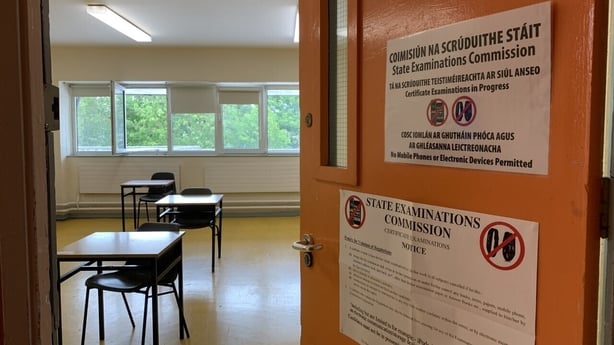Parents and teachers have taken to social media and also contacted RTÉ News to complain about what they say was an inordinately difficult Higher Level Leaving Certificate Maths Paper 1 on Friday.
Social media platforms have been awash all weekend with comments. They include parents describing distraught sons and daughters, some in tears and now panicking about their second Maths paper, which they are due to sit tomorrow morning.
"My daughter worked hard at maths including doing grinds," one mother commented on Twitter. "The panic and fear that she experienced yesterday was disgraceful. She was hoping for a H3 but after that ridiculous paper she feels she'll be lucky to pass."
This same kind of concern has been expressed over and over again.
But students and their parents have little cause to be so concerned. A difficult paper does not mean that there will be fewer high grades awarded as a result.
Every five years or so there is a similar outcry - about an unfairly difficult Higher Level Maths paper - but this does not lead to more lower grades being awarded, or fewer high grades.
This is because the system used to correct exam papers takes into account a whole variety of factors in arriving at a fair way of marking a paper.
Every year the State Examinations Commission calibrates its approach in order to ensure that consistency in grading standards is maintained over time.

They could not stand over a situation where students one year received much higher or lower grades simply because an exam paper that year happened to be easier or higher.
That would be extremely unfair to candidates.
To ensure that consistency is maintained, a complex standard setting system is in place.
This is something that every country that carries out national state exams does - although the methods differ from state to state.
Here is how the Irish method works:
Before the exams take place a marking scheme is devised for each paper, awarding scores for each question, and each part of a question. But this initial marking scheme is just a draft.
After an exam takes place a senior examinations team analyses a selection of scripts. They consider any issues that may have been raised by teachers and other professionals - such as particular difficulties thrown up by a paper - and at this stage they may make preliminary adjustments to the draft marking scheme.
The examiners - in the main teachers - who will be correcting the papers are then trained in the application of this marking scheme.
Each of those examiners then begins by correcting a sample selection of the papers they have been assigned to assess - it is usually about 6%. They send those scripts back for monitoring and review.
Here is where the standardisation really kicks in. If the results from this aggregate sample of papers does not tally with the results of previous years - if these results are noticeably better for example, or worse - then a subject's marking scheme is adjusted again. This, usually final, marking scheme is then applied across the board.
Additionally, if the marks being awarded by any individual examiner are out of kilter with the rest, if an examiner is awarding an unusual amount of high scores, or low scores for example, then this too is examined and addressed.
It is worth looking briefly at how our nearest neighbour, the UK, does it. They use a combination of expert judgement and statistical predictions based on a cohort’s previous record to decide on A-Level and GCSE grades.
They use prior attainment in GCSEs to help determine A-Level results for example, and they use data from assessments in primary school to help determine GCSE outcomes.
When this same method was suggested here as a way of determining predicted grades during the pandemic, there was an outcry and the unpopular proposal was quickly abandoned.
But there has to be some way of maintaining consistency in grades awarded over time and as the UK example shows, there are different ways of achieving this.
Maths teacher and ASTI subject spokesperson Niall Duddy says some students might actually have reason to welcome Friday’s paper.
"A tricky paper is a good thing," he says. "It may sound odd but I would prefer to have a harder paper than an easy one, because with an easy paper you have to be much more careful and precise to get the marks."
Referring to the marking system used, he says "they [the SEC] compensate for the difficult paper by being more generous with the marking. They redistribute the marks".
Niall is a teacher at Presentation College in Athenry. He, like so many other teachers, was concerned on Friday to see students very upset after their Maths paper.
This level of anxiety among students is deeply concerning, and the factors behind it need to be explored.

Is this level of anxiety part of a wider problem?
There are widespread and serious concerns about high anxiety levels among young people more generally and about what is being described by some school leaders and others as a mental health crisis affecting this generation.
The class of 2023 have not had it easy in recent years. Their education was severely disrupted by the pandemic. But they also experienced isolation at a time when they should have been learning crucial socialisation and other skills.
Right now there are thousands of students facing into the remainder of their Leaving Cert exams and some may be nervous about that second Maths paper.
"It’s only half-time," says Niall Duddy.
"Under no circumstances leave a blank space," he advises. "Remember, whatever chance you have of getting marks you will get zero if you do not attempt the question. No matter how difficult, write down something."
And students need to keep reminding themselves, over and over again, that a difficult paper does not of itself mean they will get lower grades. Parents need to reassure them of this too. They are being measured against their peers, and their performance will be judged by examiners accordingly.
State Examinations Commission
Asked for comment on claims that this year's Higher Level paper was unfair the State Examinations Commission has told RTÉ News that apart from adjustments introduced in order to compensate for pandemic learning loss "the Leaving Certificate Higher Level Mathematics Paper 1 was of the same format, structure and style as previous Leaving Certificate Higher level Mathematics papers".
It said that candidates are always expected to be able to apply their mathematical knowledge and skills to both familiar and less familiar contexts.
"Each year, therefore, candidates have encountered both straightforward problems of a routine nature, and ones which have been less familiar to them and have required them to apply their mathematical knowledge and understanding in these less practiced contexts."
The SEC confirmed that concerns and other feedback from students, parents, teachers, professional bodies and other interested parties are taken into account every year as "a normal part of the examinations process".
"Such correspondence is brought to the attention of the Chief Examiner and is considered in the refinement of the draft marking scheme. The approach taken by the SEC to the development of the final marking schemes ensures consistency in the marking and fairness to candidates," the SEC said.
Outlining the process of developing examination papers and marking schemes the SEC said they were the product of "a rigorous development process to meet the requirements of the relevant syllabi and standards of assessment."
"The examination paper development process involves a multi-stage process of drafting, setting, translating and various layers of oversight and scrutiny.
Those involved are experts in the subject who are also experienced teachers. As part of the normal paper development process, the Mathematics papers were reviewed by subject experts before they were finalised in order to assess their suitability, the appropriateness of how they assess various learning outcomes as set out in the specification, the clarity of language in them and the demand they present. Leaving Certificate examination papers are also subject to review by university representatives who view the draft examination papers and marking schemes."







